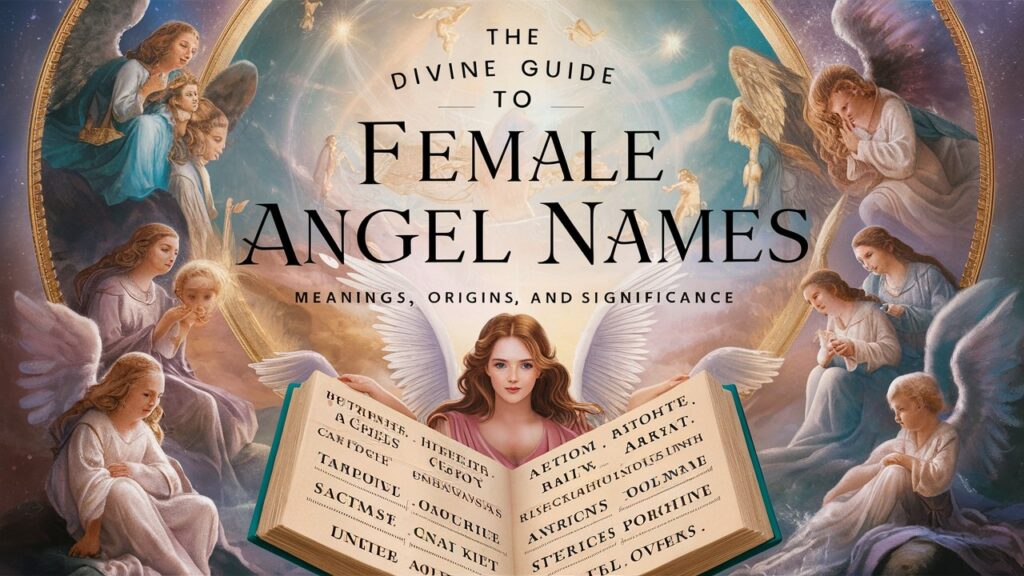The Divine Guide to Female Angel Names: Meanings Origins and Significance

Introduction to Female Angel Names
Angels have captivated human imagination for millennia, symbolizing divine messengers, protectors, and embodiments of celestial grace. While many are familiar with male angelic figures like Michael or Gabriel, female angel names carry their own mystique and spiritual resonance. These names often reflect virtues such as compassion, wisdom, and strength, rooted in ancient texts, mythologies, and cultural traditions. This article delves into the enchanting world of female angel names, exploring their origins, meanings, and roles across spiritual traditions. Whether you’re seeking inspiration for a baby name, a character in a story, or simply curious about angelic lore, this guide illuminates the celestial feminine in all its glory.
The Significance of Female Angel Names in Spiritual Traditions
Female angel names hold profound symbolic weight in religious and mystical contexts. In Christianity, Judaism, and Islam, angels are genderless in doctrine, yet cultural interpretations and apocryphal texts often depict them with feminine qualities. For instance, Seraphina (derived from “seraphim,” the highest order of angels) embodies fiery devotion, while Ariel (Hebrew for “lion of God”) appears in mystical Judaism as a protector of nature. In esoteric traditions like Kabbalah, female angels like Shekinah represent the divine feminine presence. These names often bridge the gap between the earthly and the divine, offering a connection to virtues like healing, guidance, and unconditional love.
Exploring the Origins of Female Angel Names
The etymology of female angel names reveals a tapestry of linguistic and cultural influences. Many names stem from Hebrew, Latin, or Greek, reflecting the Abrahamic roots of angelology. Laila (Hebrew for “night”) is linked to an angel overseeing childbirth in Talmudic lore, while Angelica (Latin for “angelic”) evokes purity. Others, like Raziel (“secret of God”), though often gender-neutral, are adopted for girls in modern contexts. Pagan traditions also contribute; for example, Valkyries from Norse mythology, though not angels per se, are warrior maidens guiding souls, inspiring names like Brynhildr. Understanding these origins enriches our appreciation of their spiritual and historical layers.
Popular Female Angel Names and Their Meanings
- Seraphina: Rooted in the seraphim, this name signifies “burning ones” or divine ardor. It’s associated with passion for justice and spiritual enlightenment.
- Angelica: A timeless name meaning “angelic,” symbolizing innocence and celestial grace.
- Ariel: While popularized by literature, its Hebrew origins tie it to courage and guardianship.
- Lailah: A nurturing figure in Jewish mysticism, Lailah means “night” and is tied to intuition and mystery.
- Raziel: Meaning “secret of God,” this name is tied to esoteric wisdom and revelation.
- Jeremiel: Translating to “mercy of God,” Jeremiel is associated with divine visions and emotional healing.
Each name carries a narrative, blending mythological depth with personal significance.
The Role of Female Angels in Mythology and Religion
Female angels often serve as intermediaries of mercy and compassion. In Gnostic texts, Sophia (Greek for “wisdom”) represents divine feminine wisdom, guiding souls toward enlightenment. Islamic traditions reference Israfil, an archangel who will blow the trumpet on Judgment Day, though often depicted as male, some interpretations assign feminine attributes to her role in renewal. In folklore, angels like Nemamiah (protector of travelers) and Anael (governor of love) highlight the diverse roles attributed to celestial beings. These narratives underscore how female angelic figures balance power and tenderness, offering solace in times of turmoil.

Choosing a Female Angel Name for Spiritual or Personal Use
Selecting a female angel name involves reflecting on its resonance with personal or spiritual goals. For instance, Gabrielle (feminine form of Gabriel) might appeal to those seeking communication skills, while Cassiel (angel of solitude) suits introspective souls. Consider cultural context: Parisa (Persian for “like an angel”) offers a multicultural flair, whereas Mikaela (Hebrew for “who is like God?”) honors tradition. Modern parents and spiritual practitioners alike gravitate toward these names for their melodic qualities and aspirational meanings, blending ancient legacy with contemporary relevance.
Frequently Asked Questions About Female Angel Names
Q: What are the most popular female angel names?
A: Seraphina, Angelica, and Ariel are widely recognized, alongside Lailah and Jeremiel in spiritual circles.
Q: Do female angels appear in religious scriptures?
A: While major religions rarely specify gender, apocryphal texts (e.g., Book of Enoch) and folklore often depict feminine angels.
Q: Can these names be used for babies?
A: Absolutely! Many, like Angelica or Naomi (meaning “pleasantness”), are timeless and culturally versatile.
Q: Are there female angels in Islam?
A: Islamic theology typically describes angels as genderless, though cultural stories sometimes attribute feminine traits to figures like Kiraman Katibin (recording angels).
Q: Are female angel names unisex?
A: Some, like Raziel or Cassiel, are gender-neutral but often adapted with feminine suffixes (e.g., Razielle).
Conclusion: Embracing the Celestial Feminine
Female angel names are more than linguistic curiosities—they are vessels of history, spirituality, and aspiration. From Seraphina’s fiery devotion to Lailah’s nocturnal wisdom, these names invite us to explore the divine feminine’s many facets. Whether used for personal growth, creative projects, or honoring heritage, they offer a bridge to the sacred. As you delve into their stories, may you find a name that resonates with your soul’s journey, illuminating the path with celestial light.
This comprehensive guide serves as a gateway to understanding and appreciating the profound legacy of female angel names, blending scholarly insight with practical inspiration.



